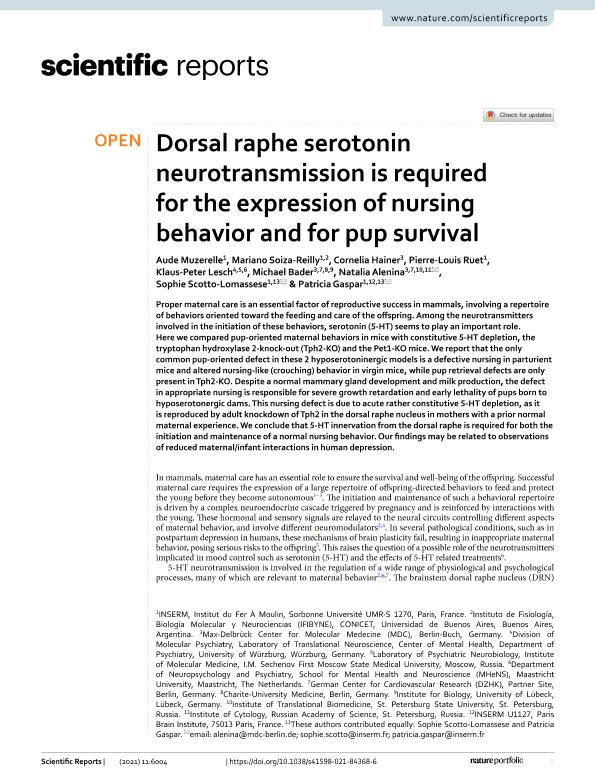Artículo
Dorsal raphe serotonin neurotransmission is required for the expression of nursing behavior and for pup survival
Muzerelle, Aude; Soiza Reilly, Mariano ; Hainer, Cornelia; Ruet, Pierre Louis; Lesch, Klaus Peter; Bader, Michael; Alenina, Natalia; Scotto Lomassese, Sophie; Gaspar, Patricia
; Hainer, Cornelia; Ruet, Pierre Louis; Lesch, Klaus Peter; Bader, Michael; Alenina, Natalia; Scotto Lomassese, Sophie; Gaspar, Patricia
 ; Hainer, Cornelia; Ruet, Pierre Louis; Lesch, Klaus Peter; Bader, Michael; Alenina, Natalia; Scotto Lomassese, Sophie; Gaspar, Patricia
; Hainer, Cornelia; Ruet, Pierre Louis; Lesch, Klaus Peter; Bader, Michael; Alenina, Natalia; Scotto Lomassese, Sophie; Gaspar, Patricia
Fecha de publicación:
12/2021
Editorial:
Nature
Revista:
Scientific Reports
ISSN:
2045-2322
Idioma:
Inglés
Tipo de recurso:
Artículo publicado
Clasificación temática:
Resumen
Proper maternal care is an essential factor of reproductive success in mammals, involving a repertoire of behaviors oriented toward the feeding and care of the offspring. Among the neurotransmitters involved in the initiation of these behaviors, serotonin (5-HT) seems to play an important role. Here we compared pup-oriented maternal behaviors in mice with constitutive 5-HT depletion, the tryptophan hydroxylase 2-knock-out (Tph2-KO) and the Pet1-KO mice. We report that the only common pup-oriented defect in these 2 hyposerotoninergic models is a defective nursing in parturient mice and altered nursing-like (crouching) behavior in virgin mice, while pup retrieval defects are only present in Tph2-KO. Despite a normal mammary gland development and milk production, the defect in appropriate nursing is responsible for severe growth retardation and early lethality of pups born to hyposerotonergic dams. This nursing defect is due to acute rather constitutive 5-HT depletion, as it is reproduced by adult knockdown of Tph2 in the dorsal raphe nucleus in mothers with a prior normal maternal experience. We conclude that 5-HT innervation from the dorsal raphe is required for both the initiation and maintenance of a normal nursing behavior. Our findings may be related to observations of reduced maternal/infant interactions in human depression.
Palabras clave:
SEROTONIN
,
DORSAL RAPHE
,
MATERNAL BEHAVIOR
,
PET-1
Archivos asociados
Licencia
Identificadores
Colecciones
Articulos(IFIBYNE)
Articulos de INST.DE FISIOL., BIOL.MOLECULAR Y NEUROCIENCIAS
Articulos de INST.DE FISIOL., BIOL.MOLECULAR Y NEUROCIENCIAS
Citación
Muzerelle, Aude; Soiza Reilly, Mariano; Hainer, Cornelia; Ruet, Pierre Louis; Lesch, Klaus Peter; et al.; Dorsal raphe serotonin neurotransmission is required for the expression of nursing behavior and for pup survival; Nature; Scientific Reports; 11; 1; 12-2021; 1-14
Compartir
Altmétricas



